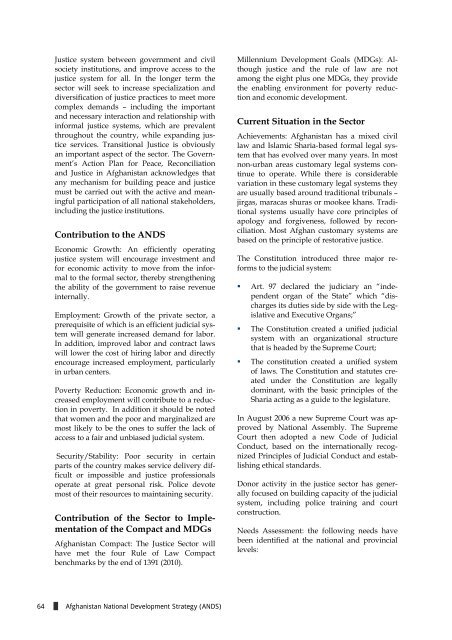Islamic Republic of Afghanistan - Enhanced Integrated Framework ...
Islamic Republic of Afghanistan - Enhanced Integrated Framework ...
Islamic Republic of Afghanistan - Enhanced Integrated Framework ...
Create successful ePaper yourself
Turn your PDF publications into a flip-book with our unique Google optimized e-Paper software.
Justice system between government and civilsociety institutions, and improve access to thejustice system for all. In the longer term thesector will seek to increase specialization anddiversification <strong>of</strong> justice practices to meet morecomplex demands – including the importantand necessary interaction and relationship withinformal justice systems, which are prevalentthroughout the country, while expanding justiceservices. Transitional Justice is obviouslyan important aspect <strong>of</strong> the sector. The Government’sAction Plan for Peace, Reconciliationand Justice in <strong>Afghanistan</strong> acknowledges thatany mechanism for building peace and justicemust be carried out with the active and meaningfulparticipation <strong>of</strong> all national stakeholders,including the justice institutions.Contribution to the ANDSEconomic Growth: An efficiently operatingjustice system will encourage investment andfor economic activity to move from the informalto the formal sector, thereby strengtheningthe ability <strong>of</strong> the government to raise revenueinternally.Employment: Growth <strong>of</strong> the private sector, aprerequisite <strong>of</strong> which is an efficient judicial systemwill generate increased demand for labor.In addition, improved labor and contract lawswill lower the cost <strong>of</strong> hiring labor and directlyencourage increased employment, particularlyin urban centers.Poverty Reduction: Economic growth and increasedemployment will contribute to a reductionin poverty. In addition it should be notedthat women and the poor and marginalized aremost likely to be the ones to suffer the lack <strong>of</strong>access to a fair and unbiased judicial system.Security/Stability: Poor security in certainparts <strong>of</strong> the country makes service delivery difficultor impossible and justice pr<strong>of</strong>essionalsoperate at great personal risk. Police devotemost <strong>of</strong> their resources to maintaining security.Contribution <strong>of</strong> the Sector to Implementation<strong>of</strong> the Compact and MDGs<strong>Afghanistan</strong> Compact: The Justice Sector willhave met the four Rule <strong>of</strong> Law Compactbenchmarks by the end <strong>of</strong> 1391 (2010).Millennium Development Goals (MDGs): Althoughjustice and the rule <strong>of</strong> law are notamong the eight plus one MDGs, they providethe enabling environment for poverty reductionand economic development.Current Situation in the SectorAchievements: <strong>Afghanistan</strong> has a mixed civillaw and <strong>Islamic</strong> Sharia-based formal legal systemthat has evolved over many years. In mostnon-urban areas customary legal systems continueto operate. While there is considerablevariation in these customary legal systems theyare usually based around traditional tribunals –jirgas, maracas shuras or mookee khans. Traditionalsystems usually have core principles <strong>of</strong>apology and forgiveness, followed by reconciliation.Most Afghan customary systems arebased on the principle <strong>of</strong> restorative justice.The Constitution introduced three major reformsto the judicial system:• Art. 97 declared the judiciary an “independentorgan <strong>of</strong> the State” which “dischargesits duties side by side with the Legislativeand Executive Organs;”• The Constitution created a unified judicialsystem with an organizational structurethat is headed by the Supreme Court;• The constitution created a unified system<strong>of</strong> laws. The Constitution and statutes createdunder the Constitution are legallydominant, with the basic principles <strong>of</strong> theSharia acting as a guide to the legislature.In August 2006 a new Supreme Court was approvedby National Assembly. The SupremeCourt then adopted a new Code <strong>of</strong> JudicialConduct, based on the internationally recognizedPrinciples <strong>of</strong> Judicial Conduct and establishingethical standards.Donor activity in the justice sector has generallyfocused on building capacity <strong>of</strong> the judicialsystem, including police training and courtconstruction.Needs Assessment: the following needs havebeen identified at the national and provinciallevels:64<strong>Afghanistan</strong> National Development Strategy (ANDS)
















